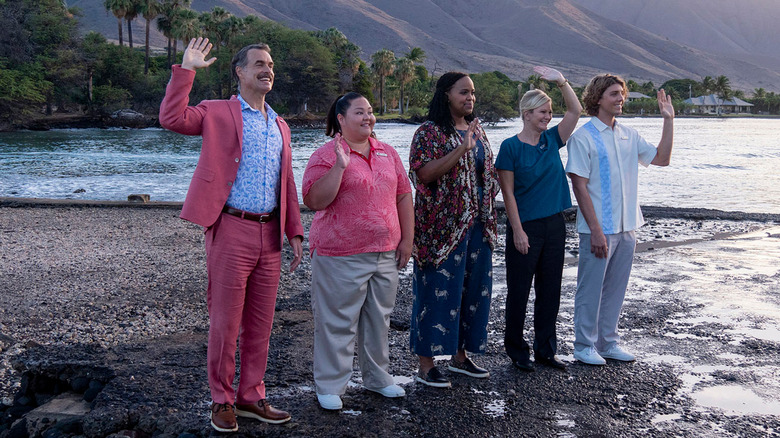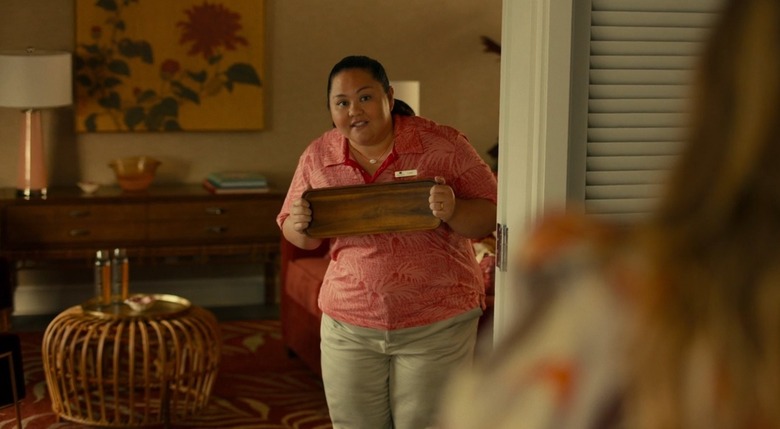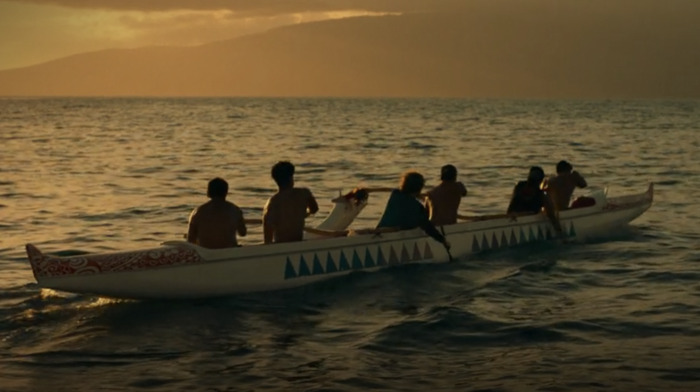Something Bad Happened On 'The White Lotus' Season Finale
This post contains major spoilers for season 1 of The White Lotus.
In the season finale of HBO's The White Lotus, terrifying mean girls Olivia (Sydney Sweeney) and Paula (Brittany O'Grady) share one of the most poignant scenes in the series.
Halfway through the episode, the hotel room fills with tension. With a sideways glance, Olivia casually reveals that she knows the secret her friend had desperately tried to hide: the thief who broke into the room the day before was Paula's "island lover" Kai (Kekoa Scott Kekumano). Worst of all, Olivia knows that Paula played a part in the robbery by giving Kai the code to their safe.
The misery on Paula's face tells all, but despite putting the clues together, Olivia still misunderstands. She assumes Paula's tears are for fear of being held responsible or at the very least, caught for her role in the crime. She assumes the lovers put together their heist for the sake of having extra cash and figures her friend just needed money. And when Paula dismisses the truth by saying Olivia wouldn't understand, she brushes off the remark, claiming that she isn't like her wealthy, privileged parents.
Paula responds by decimating Olivia's illusion of her wokeness, affirming that however much she tries to rebel, she's chosen her "tribe." Olivia is a member of the wealthy elite no matter how much she pretends otherwise. Proving Paula's point, Olivia tearfully deflects by flipping back to accusatory, returning to the subject of the robbery. She says, "My mom could've gotten really hurt. Something bad could've happened."
Heartbroken, Paula replies: "Something bad did happen."
And though she understands the reality of Olivia's privilege, Paula refuses to confront her own. However torn up she feels about Kai's presumed arrest, she ends the series alongside the Mossbacher family, boarding the plane home. She chooses her tribe too, returning to the fold just a few scenes later when she accepts Olvia's embrace. Despite seeing the problem in everyone else, Paula never quite musters the resolve to deal with her own flaws. And funnily enough, The White Lotus shares in Paula's dilemma.
Some Things Never Change
Since The White Lotus first premiered, the ongoing joke has been its familiar premise: another show about awful rich white people? It was laughable, especially coming from HBO, who have cornered the market on this little subgenre, with fan-favorite entries like Big Little Lies, Veep, The Undoing, Sex and the City, and Entourage.
I almost wanted to resist the show based on premise alone — how many more times do I have to watch a group of loathsome billionaires work through a few mini-crises before ultimately returning to their charmed lives? But it's hard to resist the allure of Twitter's latest favorite show and anyway, The White Lotus promised to be different. Unlike HBO's older entries like Sex and the City, this show is in on the joke.
Obviously, other recent shows share in their self-awareness. Big Little Lies' Renata (Laura Dern) mostly exists to throw hilarious tantrums and yell about money, while Succession's Connor Roy (Alan Ruck) is just a walking punchline. But for all their jokes and jabs at the wealthy elite, we ultimately feel bad for them by the end of each episode. We know Kendall Roy's (Jeremy Strong) a spoiled narcissist, but he's also our #1 boy, the lesser of the show's many evils.
But over here in the world of The White Lotus, everyone is wholly contemptible! The show is on your side — rich people are the worst. It's easy to laugh along as Jake Lacy's Shane spends his entire honeymoon complaining that his luxurious suite isn't the one he wanted because we all know he sucks. And yeah, many of the characters have moments of self-discovery, but the most we can muster for the quickly spiraling Mark Mossbacher (Steve Zahn) is pity. The man falls apart at the discovery that his father slept with other men and it's honestly pretty delightful.
But The White Lotus can't be all derision, all the time. It needs an emotional core, so we latch onto the few relatable guests in the mix — chief among them is Alexandria Daddario's Rachel, a freelance journalist who recently married into money. Shockingly, this proves to be a mistake: Rachel ends the series by crossing over to the dark side, and chooses money over integrity because it's easier. So who then is the real emotional core of the series? That responsibility falls on the resort's staff members, like Belinda (Natasha Rothwell), Armond (Murray Bartlett), and Kai.
Like us, they see the effect wealth has had on the self-obsessed guests. Worse yet, they have to endure it all face to face, waiting on them, however much they'd like to keep their distance. The most painful thing of all is how severely it damages them. While the guests are free to hop on a plane and leave wrecked lives in their wake, the staff members are sucked into their orbits and thrown aside at the first opportunity. As the people most drastically impacted, the staff members are the secret protagonists of The White Lotus — or at least, the show pretends they are.
Ultimately, The White Lotus is about the harm done by the wealthy — the power they yield, the privilege they enjoy, and the ease with which they can leave destruction behind. And to explore all that effectively, the show needs the people who exist on the other end of that spectrum. So the staff members give Shane someone to torture and Tanya (Jennifer Coolidge) someone to break. But beyond that, they aren't given more thought. Sure, The White Lotus is delightful, effective satire, but it also leaves an unmistakable bitterness behind, along with the tortured characters it never quite makes time for.
The Left Behind
Noticing the problem isn't the same as understanding it. The White Lotus illuminates the flawed and privileged guests at the expense of everyone around them. But rather than use the staff members and native voices to bolster its scathing commentary, the show casts them aside.
In the first episode, Armond describes the staff as "interchangeable helpers," noting that the guests don't really see or acknowledge them as individuals. The series proves him right with every other staff-guest dynamic it builds: Tanya uses Belinda for comfort but never cares to know her, Shane makes Armond the target of all his frustrations, and even Paula starts a relationship with Kai that she refuses to entertain beyond their brief week together.
There's also the matter of the two Indigenous characters in the series, who are the definition of interchangeable. Lani (Jolene Purdy) is a new trainee who doesn't last beyond the series premiere, after going into labor in the middle of her first shift. At first, she's determined not to leave work or acknowledge the oncoming birth because she needs the money — but she can only delay so much. After presumably being let go, Lani never reappears, emphasizing how little the staff matters once they're not of service to the guests. Later, when Kai begins a fling with Paula, we almost get a chance to know him. Sort of.
Their nighttime rendezvous includes a brief conversation where Kai runs us through the basics of Hawaii's colonization. There's been a lot of insightful analysis concerning this scene's many flaws, among them its clumsy attempt at acknowledging the island's Indigenous people. Kai's story about picking seashells and mention of tension with his brothers is interesting but ultimately hollow. It serves the purpose of setting up the exciting robbery plot point, giving Kai motivation, and crossing colonization off the necessary acknowledgment list.
Later, when Kai escapes the scene of his crime, much like Lani, he never returns. In the finale, we learn that's he's been caught offscreen, and obviously, his absence is meant to sting. Our hearts should ache for Kai because he was needlessly caught up in Paula's revenge scheme — which is mostly true. For the most part, Kai functions as a stand-in for the Indigenous people harmed by the invading visitors. He exists to be sucked into their orbit and thrown out in the most tragic fashion possible. And as it all goes down, what's going through Kai's head? How could we possibly know?
We feel for the sweet, hunky bellhop because of the heartbreaking implications of his capture. But the pain is hollow, lightened by the fact that Kai was barely a character, to begin with. Of course, he was only a blip on the reader for the hotel guests, but that shouldn't be true for the audience.
In the End...
In an interview with Vulture, series creator Mike White admitted that the more he built the show out, the more he realized he connected with Armond and Quinn (Fred Hechinger). Given the grandeur of their finale moments, this shouldn't come as a surprise. Armond is the body at the end of the series, and Quinn is the only guest wh0 becomes a slightly better person (however surface level his "transformation"). They get operatic endings, tragic and heartfelt moments of ascension. Its noticeably dissimilar to the others, who simply fizzle out, boarding the plane on the return trip home to resume life as it was before their trip.
Quinn ends up abandoning his family and the plane home to stay in Hawaii. He decides to join the crew of Hawaiian rowers he spent the trip bonding with, telling his family, "the guys need a sixth for their crossing... and in the spring, we're all going to do a Hokule'a through all of Polynesia, which sounds amazing."
It's hard not to wonder about the rowers who invited Quinn along, and what they think of his presence on the Polynesian trip. But of course, this isn't really about them. They aren't named characters and we never even see them extend him an invitation — whatever the nuances of that relationship are, we'll never know. The important thing is Quinn has ascended and decided to turn away from his family's wealth and privilege.
Given the sweeping final shot of Quinn rowing away, it's hard to tell if the series is in on the joke here. Whatever realization Quinn has happened upon after a few days rowing a canoe won't outlast his desire to finally get his new phone or Nintendo switch. He'll probably return in a matter of days and in adulthood, he'll be telling the tale of how he almost rowed through Polynesia at parties.
The harsh truth, the biggest "something bad" of them all, is that everything is just as it was. As it is when the credits roll, the show ends, and we all return to reality. The status quo is undisturbed.



